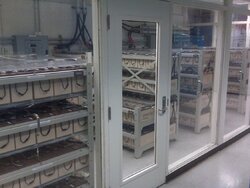The solar panels connect to a charge controller which charges a bank of golf cart batteries. The batteries connect to an inverter which change the DC power to 120 volts AC --which is run throughout the house in a conventional manner. Most rooms have several 4-watt compact fluorescent spiral light bulbs strategically placed, so that at any given time we have only one or two lights on at the same time. The largest bulb in the house is a 7-watt spiral. I have several 2-watt spirals which get a lot of use---they are very effective if installed in a student type bullet lamp housing. That system also powers my iBook computer and a 7" TV (man, that's small!) and DishNetwork receiver. It can handle occasional moderate loads like a food mixer, Dirt Devil hand vacuum, and electric drill. I've experimented with LED lights and do not care for them. I run a ham radio station directly from the 12 volts DC.
For larger draw items like washing machines, dishwasher, circular saw, clothes iron, etc we have a 4000 watt Onan generator (run efficiently slow at 1800 rpm...) that can be remotely started and stopped from several remote switch panels throughout the house and garage. That generator also powers a large industrial battery charger which can very quickly top off my battery bank.
Late in the evening, when I've used up all the power that the sun put in my batteries, I can run the generator for about 10 minutes which will bring the batteries up to a full charge. That 10 minutes of generator time is equal to about two hours of TV time or four hours of computer time (with a room light or two also burning.) A small alarm buzzer sounds whenever the battery voltage drops to 12.00 volts or reaches above 14.40 volts---that is what "tells" me when to start or stop the generator.
Bottom line: the solar panels run all the smaller loads all the time during the summer. During the winter, the solar panels keep up with things until about 9 PM.... then I have to start have 10 minute generator sessions every few hours if I plan on staying up late and watching TV or computing. If I'm just reading most of the night, I don't need the generator at all.
Key to making all of this work, is how I handle certain other vital "chores". The refrigerator/freezer and cook stove run on propane. A submersible well pump is run by the generator only when the clothes washer is on (perhaps two hours a week.) This pumps water up to a 1200 gallon tank buried way up the hill from my house. The rest of the time, the water just gravity feeds to the house from that tank... the pressure gives us a decent shower. We would go broke trying to run a generator to keep up with a regular type refigerator or a conventional well pump system. We heat with wood... of course.
There is a
lot of copper wire in this house. There are three completely separate wiring systems throughout: 12 volts DC (mostly on 6 gauge wire!), 120 volts AC from the generator, and 120 volts AC from the inverter.
If this sounds complicated, you should see my
plumbing system...

---------------
There is a saying about money: it's not how much you make that counts, but rather how much you spend.
With solar power: it's not how much you produce... what matter's most is how
little energy you can manage to live with comfortably.
Yes, I have lots of people tell me that they'd like to "go" solar. I always tell them: "Before you "go" anywhere... before you buy anything... CUT your energy usage in half. When you stop crying about that, then cut it in half
again! Only
then are you ready to get some solar equipment. It makes absolutely no sense at all to be buying expensive solar equipment when your house is full of large screen TV's, microwave ovens, big vacuum cleaners, and huge light bulbs. It simply will not work.
Lose your appetite for power first.



